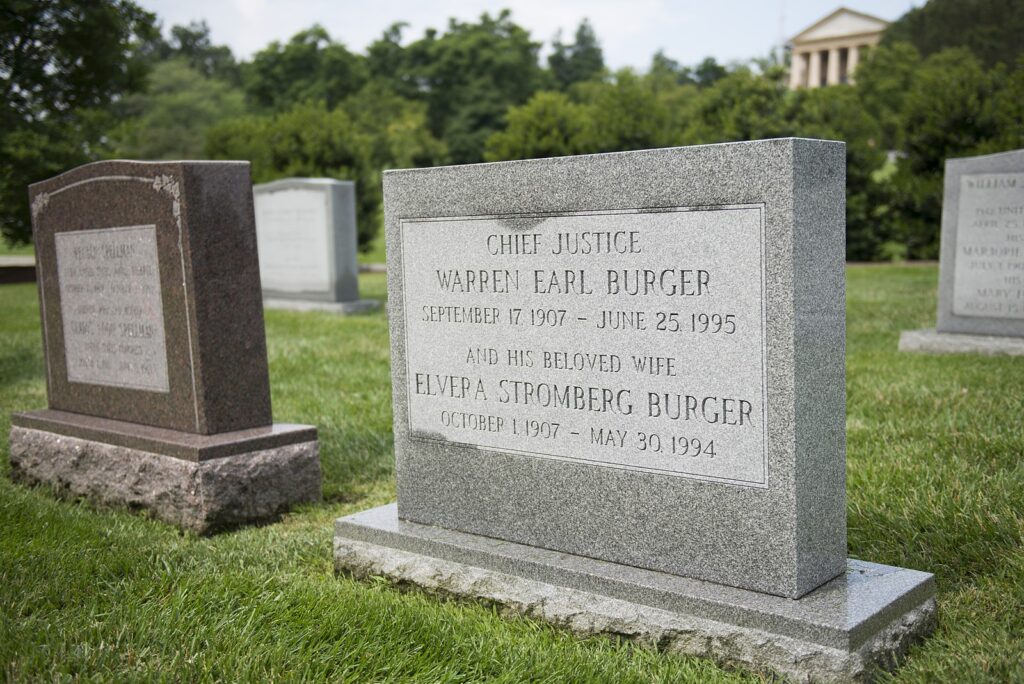Erik Visits an American Grave, Part 277
This is the grave of Warren Burger.
Born in 1907 in Saint Paul, Minnesota to a working class family, Burger’s father was a salesman and railroad cargo inspector. He had to deliver newspapers at the age of 9 to contribute to the family finances. Burger attended the University of Minnesota, working in insurance and taking night classes, and then the St. Paul College of Law. He rose pretty quickly in the legal profession and in Minnesota Republican politics, as he was a big supporter of Harold Stassen, managing his presidential campaigns in 1948 and 1952. He began arguing cases in front of the Supreme Court in the 1940s, including defending the government in the Texas City explosion case to make sure it had to pay no compensation to killing hundreds of workers through atrocious workplace safety standards. Dwight Eisenhower rewarded this loyal Republican by making him assistant Attorney General for the Civil Rights Division in 1953 and then naming him to an Appeals Court seat in 1955. He was known as a moderate-conservative, except for hard-right decisions on law and order issues.
In 1968, Earl Warren decided to retire. Lyndon Johnson nominated Abe Fortas to replace him. But the Senate filibustered him. Now Johnson made a terrible choice here due to Fortas’ ethical problems, indicative of the sloppy and haphazard way of choosing Supreme Court justices through basically all of American history before Nixon except for FDR. It’s really kind of amazing. Anyway, in a move Mitch McConnell would surely approve of, Fortas wasn’t allowed to take over as Chief Justice and then, voila!, Nixon was president. Now a Republican could replace that Republican and it was Warren Burger. Nixon liked Burger because Burger had given speeches slamming on the Fifth Amendment and attacking the Warren Court. Already, the move to “originalism,” meaning “judgments that support Republicans, white supremacists, and corporations” was gaining steam. Nixon pledged to name a strict constructionist to the Court and there was lovely Judge Burger. Incidentally, Nixon loved Burger so much that when he realized that invading Cambodia might be so unpopular that he couldn’t run for reelection, he asked Burger to run to replace him. Burger was also a finalist to replace Spiro Agnew as VP, but of course Gerald Ford was chosen instead.
However, Burger was not the right-wing ideologue Nixon wanted. His court was hardly a liberal one, but it also didn’t really reverse the Warren Court’s decisions on racial justice and limitations on state power that Nixon hated. In 1971’s Swann v. Charlotte-Mecklenburg Board of Education, the court unanimously ruled in favor of the city’s busing programs to end school segregation. The next year, his court also ruled unanimously in U.S v. U.S. District Court that the Nixon administration had to follow the Fourth Amendment in cases of domestic surveillance, upholding the Warren Court’s Miranda decision. Moreover, Burger agreed with the right to privacy argument that supporters of legal abortion presented in Roe v. Wade and he sided with majority. Burger would later vote against legal abortion in cases, but in the critical one, he was on the right side. Then in 1974’s U.S. v. Nixon, the unanimous court ruled that Nixon had to hand over his secret tapes. Burger was the most reticent on this case, for he thought that Watergate wasn’t a big deal, but he was persuaded by the rest of the Court.
Burger was certainly terrible on many issues, especially gay rights, which he considered an abomination. He cited Blackstone in his concurring opinion in Bowers v. Hardwick, upholding a Georgia law criminalizing sodomy because Blackstone, like Burger, was a homophobe. Isn’t originalism great! He dissented in Furman v. Georgia, which invalidated the death penalty and then voted to reinstate it in Gregg v. Georgia in 1976. Georgia has all the great laws.
In the end, Burger was the weakest Chief Justice of the last half-century. His colleagues largely had little respect for him. He frequently switched his vote in conference to maintain control over who wrote opinions and because he wanted to be in the majority. Potter Stewart, who hated Burger and who resented not getting the Chief Justice nod himself, was a top informant for Woodward and Bernstein’s The Brethren, a book dishing on the Court.
Burger retired from the Court in 1986, stayed involved in public life as a sort of senior wise man. Later his life, he turned with a fury against the National Rifle Association and Second Amendment extremists, calling the recent interpretation of the Second Amendment a “fraud” on a 1991 episode of the McNeill/Lehrer News Hour and then arguing in 1992 that the amendment does not guarantee the rights of private citizens to own guns at all. So that’s definitely a point in his favor. Burger died in 1995 at the age of 87. Reagan replaced Burger on the Court with a very nice man named William Rehnquist and nothing bad ever happened again.
Warren Burger is buried on the confiscated lands of the traitor Lee, Arlington National Cemetery, Arlington, Virginia.
If you would like this series to profile other Supreme Court justices, you can donate to cover the required expenses here. Byron White is in Denver while John Marshall Harlan is in DC, among so many possibilities. Previous posts in this series are archived here.




